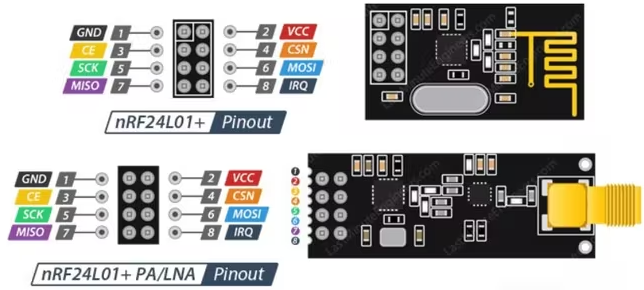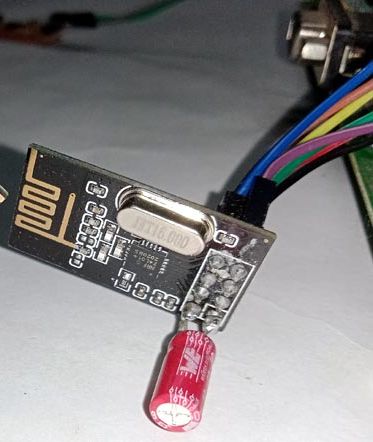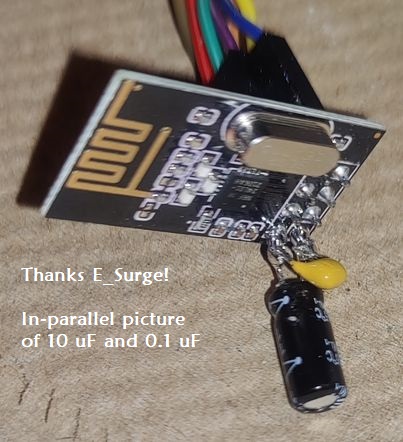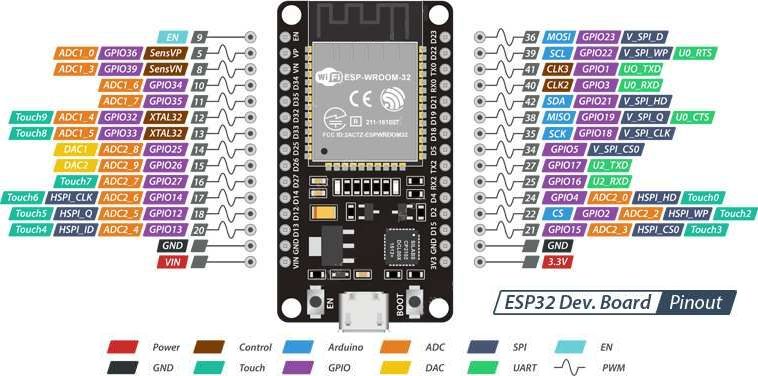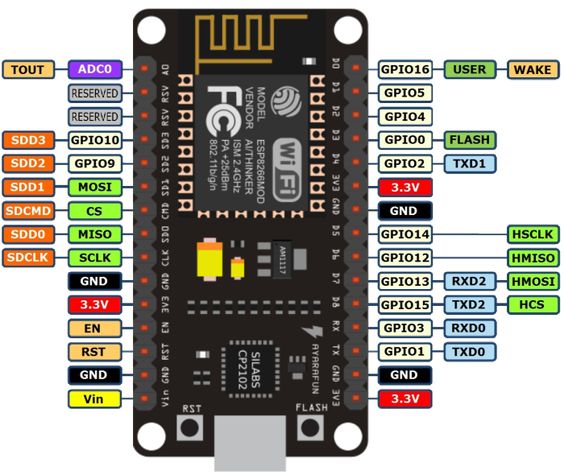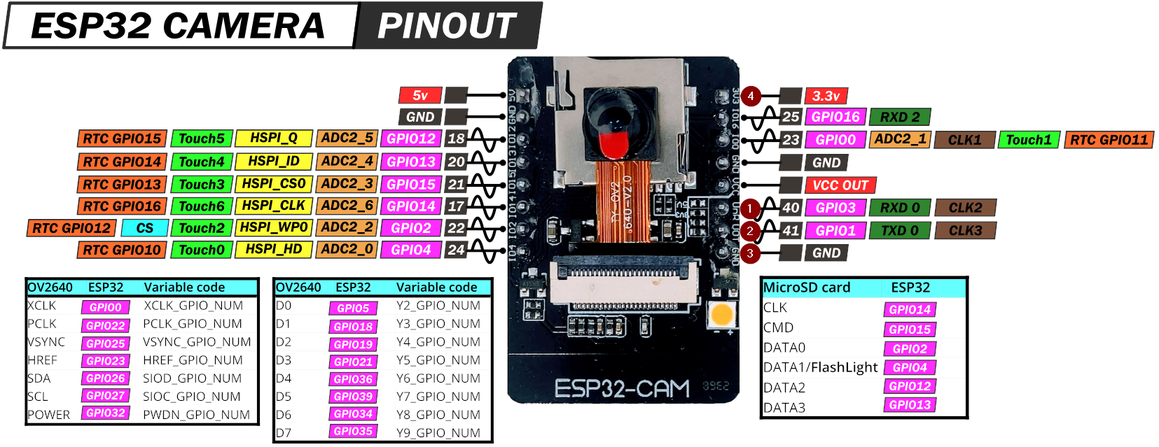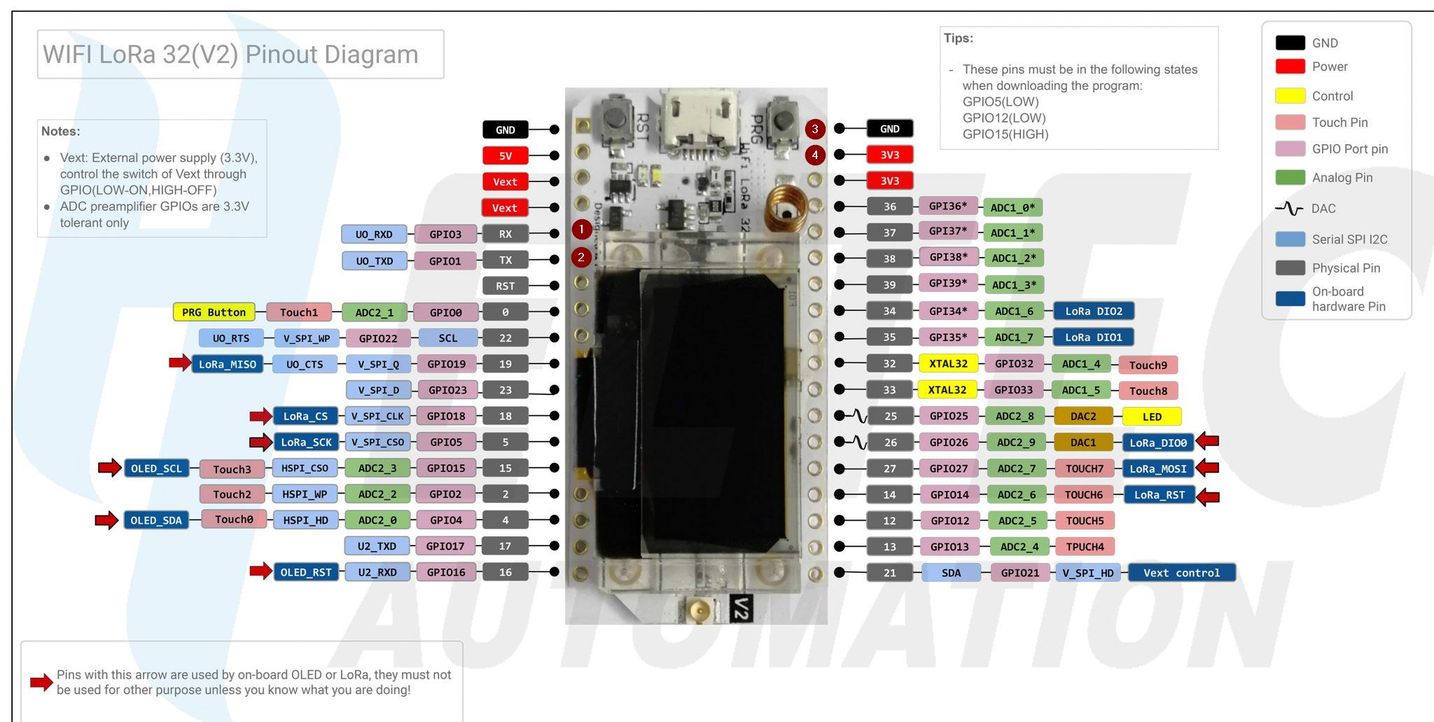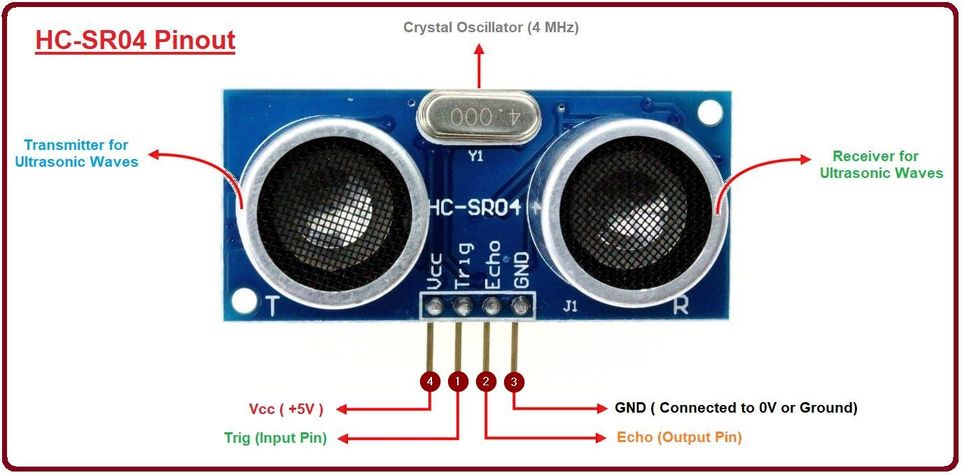7.6 KiB
Documenting adventures with the GPIO...
Official GPIO layout created by Aleksandr Kutuzov. Official documentation is here!
Check out some unofficial boards by DrB0rk and an extender by Speexvocon!
Sentry Safe plugin pinout
Plugin by H4ckd4ddy
(Flipper) 8/GND -> Black wire (Safe)
(Flipper) 15/C1 -> Green wire (Safe)
NRF24L01+ / Mousejack pinout - 8-pin
Plugin by mothball187 | Affected devices from Bastille research
More info from RogueMaster and Unleashed. (Both include the plugin in their firmware releases.)
2/A7 on FZ goes to MOSI/6 on NRF24
3/A6 on FZ goes to MISO/7 on NRF24
4/A4 on FZ goes to CSN/4 on NRF24
5/B3 on FZ goes to SCK/5 on NRF24
6/B2 on FZ goes to CE/3 on NRF24
8/GND on FZ goes to GND/1 on NRF24
9/3V3 on FZ goes to VCC/2 on NRF24
IRQ/8 is left disconnected on NRF24
If the nRF model is acting a bit flakey, try adding a capacitor to the vcc/gnd lines! I've not tried the Plus model so it may have a bigger need for a cap. Otherwise, I haven't had any major issues. Anything from a 3.3 uF to 10 uF should do. (Watch your positive/negative placement! Negative to ground.) I learned if you wanna get fancy, include a 0.1 uF cap in parallel. The 3.3 uF to 10 uF will respond to slow freq changes while the 0.1 uF will respond to the high freq switching spikes that the larger one cannot. That said, a single 10 uF will likely suffice for the Mousejack attack. ¯\_(ツ)_/¯
NRF24L01+ (B) - 10-pin
Thank you to Amec0e for the information on the newer NRF24L01 (B)!
NRF24: 1 (CE) to FZ 6 (B2)
NRF24: 2 (SCK) to FZ 5 (B3)
NRF24: 3 (CSN) to FZ 4 (A4)
NRF24: 4 (MOSI) to FZ 2 (A7)
NRF24: 6 (MISO) to FZ 3 (A6)
NRF24: 7 or 8 (GND) to FZ GND (8 or 11 or 18)
NRF24: 9 or 10 (VCC) to FZ 9 (3v3)
ESP32-WROOM
NOTE: Use old_hardware.bin if flashing Marauder onto the ESP32-WROOM (thanks wyldgoat!)
ESP8266
If you have the ESP8266 and are looking to use a wifi deauth, check out speexvocon's easy web flasher!
ESP32 / ESP32-WROOM / ESP8266 Pinout to Flipper Zero
(Thanks E_Surge and wyldgoat for guidance!)
NOTE: Make sure you're using at least an ESP32 v2 or above for full functionality! Good read.
ESP32: 3 (RX0) -> FZ: 13 or 15 (these are TX pins)
ESP32: 1 (TX0) -> FZ: 14 or 16 (these are RX pins)
ESP32: GND -> FZ: 8 or 11 or 18 (GND)
ESP32: 5V -> FZ: 1 (5V) OR ESP32: 3.3V -> FZ: 9 (3.3V)
NOTE: Make sure to enable 5v under GPIO on the Flipper
Switch between UART Pins 13/14 and 15/16 setting in FlipperZero
(GPIO -> USB-UART Bridge -> LEFT -> UART Pins)
A visual pinout can be seen in this PDF, too.
ESP32-CAM (Camera)
ESP32-CAM Pinout to Flipper Zero
CAM32: 1 (RX0) -> FZ: 13 or 15 (these are TX pins)
CAM32: 2 (TX0) -> FZ: 14 or 16 (these are RX pins)
CAM32: 3 (GND) -> FZ: 8 or 11 or 18 (GND)
CAM32: 4 (3.3V) -> FZ: 9 (3.3V) OR ESP32: 5V -> FZ: 1 (5V)
LoRa ESP32 Wifi (Wifi + Bluetooth + LoRa 433 MHz)
LoRa ESP32 Wifi Pinout to Flipper Zero (PENDING VERIFICATION)
LoRa32: 1 (RX0) -> FZ: 13 or 15 (these are TX pins)
LoRa32: 2 (TX0) -> FZ: 14 or 16 (these are RX pins)
LoRa32: 3 (GND) -> FZ: 8 or 11 or 18 (GND)
LoRa32: 4 (3.3V) -> FZ: 9 (3.3V)
Switch between UART Pins 13/14 and 15/16 setting in FlipperZero
GPIO -> USB-UART Bridge -> LEFT -> UART Pins
Raspberry Pi Zero UART
Raspberry Pi Zero : Prerequisite
Mount your SD Card to your computer and add the following line at the end of /boot/config.txt file.
enable_uart=1
Additionally you can look at the baudrate in the /boot/cmdline.txt file, which should be 115200 by default.
Raspberry Pi Zero : Pinout to Flipper Zero
PiZero: 4 (5V) -> FZ: 1 (5V)
PiZero: 6 (GND) -> FZ: 11 (GND)
PiZero: 8 (UART0_TXD) -> FZ: 14 (RX)
PiZero: 10 (UART0_RXD) -> FZ: 13 (TX)
Some other accessories to try with Flipper (Code needed!)
HC-SR04 Ultrasonic Distance Sensor
Plugin by Sanqui: https://github.com/Sanqui/flipperzero-firmware/blob/hc_sr04/applications/hc_sr04/hc_sr04.c
HC-SR04: 1 (RX0) -> FZ: 13 or 15 (these are TX pins)
HC-SR04: 2 (TX0) -> FZ: 14 or 16 (these are RX pins)
HC-SR04: 3 (GND) -> FZ: 8 or 11 or 18 (GND)
HC-SR04: 4 (5V) -> FZ: 1 (5V)
Switch between UART Pins 13/14 and 15/16 setting in:
Flipper -> GPIO -> USB-UART Bridge -> LEFT -> UART Pins
I've had so many asking for me to add this.


BTC: 3AWgaL3FxquakP15ZVDxr8q8xVTc5Q75dS
BCH: 17nWCvf2YPMZ3F3H1seX8T149Z9E3BMKXk
ETH: 0x0f0003fCB0bD9355Ad7B124c30b9F3D860D5E191
LTC: M8Ujk52U27bkm1ksiWUyteL8b3rRQVMke2
So, here it is. All donations of any size are humbly appreciated.


Donations will be used for hardware (and maybe caffeine) to further testing!

